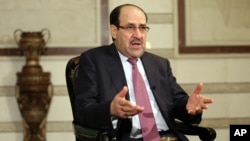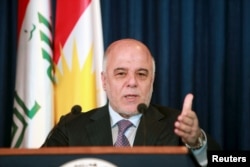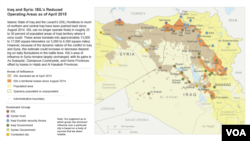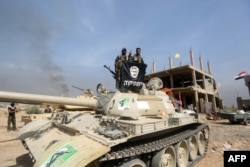Former Iraqi Prime Minister Nouri al-Maliki said his parliamentary bloc of 60 lawmakers is withdrawing support from his rival and successor, current Prime Minister Haidar al-Abadi, and Abadi's program to reform Iraq's bureaucracy.
Maliki's attempt to derail Abadi's political reform program and possibly unseat him, as well, comes at a time of great regional uncertainty, as both the U.S. and Russia remain at loggerheads in the battle against Islamic State militants.
Iran and its Shi'ite militia allies have publicly criticized the U.S. over its efficacy in targeting Islamic State militants in Iraq and some have openly supported a rival security sharing alliance with Russia.
Abadi has not opposed the deal, although U.S. Joint Chiefs of Staff Chairman General Joseph Dunford said recently that Iraq's prime minister and defense minister had told him they were not seeking Russian military help against the Islamist militants.
Iran ties
Maliki, who has close ties to Iran, is also said to oppose a stronger role for U.S. forces in the battle against the Islamic State group.
Qais al-Khazali, pro-Iranian militia commander and an ally of Maliki, said Tuesday he thought the U.S. was not very useful in combating the Islamic State group and that he preferred Russian help.
Khazali claims the U.S. and its 60 coalition partners often do not hit the most important Islamic State targets and frequently drag their feet with requested airstrikes, while Russia is hitting and destroying IS targets in Syria quickly and efficiently.
Wednesday, Prime Minister Abadi defended his reform program, taking an oblique stab at his rivals, including Maliki, claiming that they were protecting their own interests.
He said his reform program hurts the interests of some politicians, including their large security cortèges, and Iraq can no longer afford to pay for such luxuries (given the recent drop in oil prices).
Maliki ally
Sheik Hamid Ma'idi Saidi, spokesman for Shi'ite leader Ammar Hakim, an ally of Maliki in parliament, told al Arabiya TV that some politicians are “worried” about Abadi's reform program and want “more dialogue” in its implementation, but that they are “not withdrawing support for him.”
James Denselow of the Foreign Policy Center in London told VOA he does not believe that Maliki currently has an Iranian "green light" to oust Abadi.
“I think this is more about Maliki's personal ambitions than it is about Abadi's ability to be a flexible pragmatist. I think he's shown an ability to accommodate the pressures from various sides to date and he still seems to have the Iranians and their militias on board," Denselow said.
However, gulf analyst Theodore Karasik disagrees, arguing that he thinks Maliki's “withdrawal of his support (from Abadi) has Iran's backing or even orders.”
Abadi “is caught between Russia and the U.S.,” as well as the Iraqi Shi'ite militias, Karasik said.







